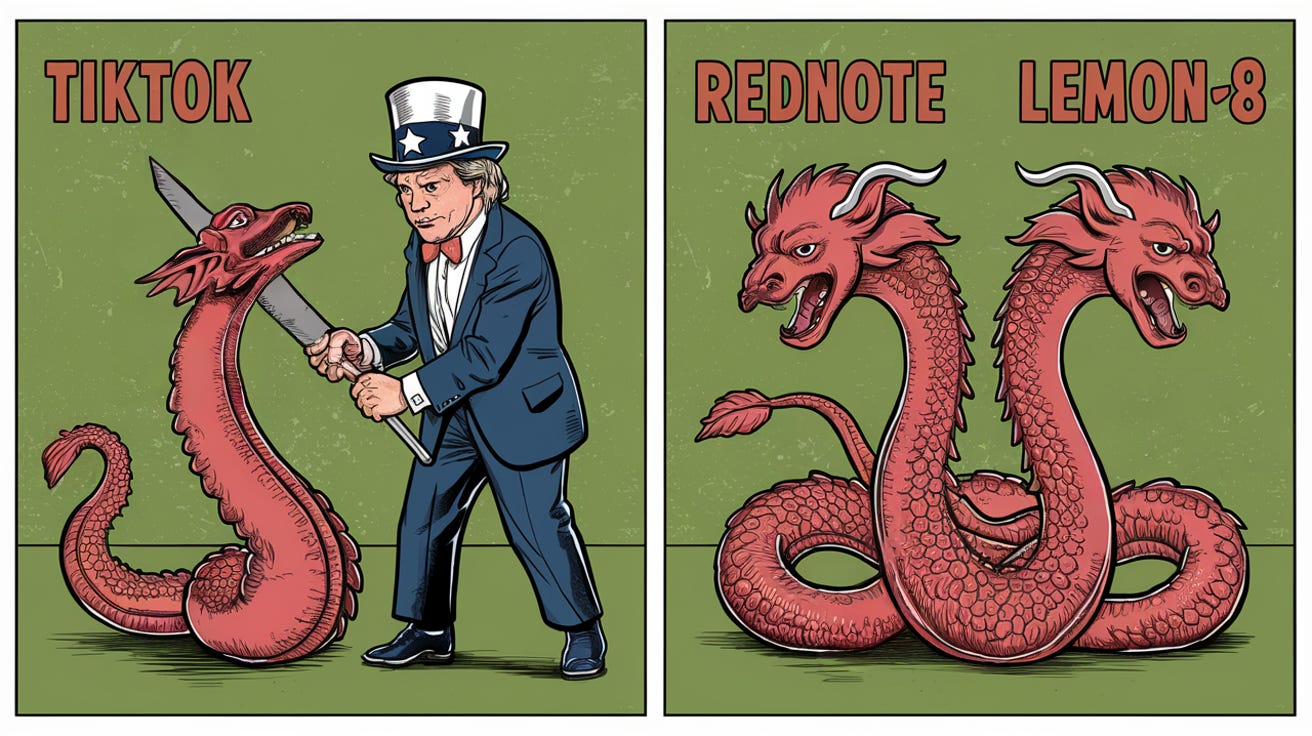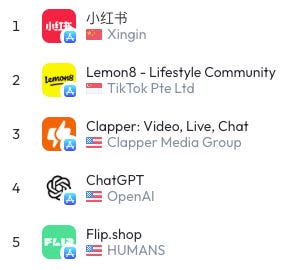TikTok is more than an app
It's a formula and a habit that will endure regardless of the fate of ByteDance's branded app
Like a lot of successful tech products, TikTok became the phenomenon it is today not by developing a new unique capability, but by assembling existing capabilities in a uniquely powerful combination.
The key ingredients of the TikTok formula are:
1. Autoplaying full-screen vertical short-form video (no need to rotate your phone, no need to actively choose anything, no need for an attention span)
2. A vertical swipe to dismiss/start the next video playing (super low effort, generates lots of data points and rewards the creation of instantly engaging content)
3. An army of creators working for free in pursuit of fame and/or fortune with tools to support creation and monetisation
4. Algorithms honed to serve up the videos most likely to keep you watching, informed by every swipe, like, comment, bookmark and share (so not reliant on building a social graph).
The assembly of these four ingredients has done something unusual: it’s created a new habit.
A habit that’s colonised an hour of its users’ waking hours (and possibly reduced the amount of sleep they get).
A habit so strong that when TikTok's US future was in doubt last week, hundreds of thousands of people downloaded Xiaohongshu (aka rednote) - a Chinese TikTok clone with content predominantly in Mandarin and no English name or description in the App Store (see below grab, taken last Wednesday).
Whilst much is made of TikTok’s algorithms, which have been fine-tuned over many years and are non-trivial to replicate, its biggest moat is its creator ecosystem. While creators could theoretically migrate to other platforms, TikTok has built something more complex than just a pool of talent. It's fashioned an ecosystem where creators can easily collaborate, make money, and ride viral trends.
That said, had TikTok been shutdown for an extended period in the US, I have no doubt those creators would have found a home elsewhere, even if they’d then grumbled about the algorithm and sub-optimal monetisation (although to be fair they already do that about TikTok).

Whilst Meta and Google’s TikTok clones, Instagram Reels and YouTube Shorts, and Snapchat might seem like the most likely beneficiaries of a TikTok exodus, a host of other, less well known apps have seen a significant influx of traffic whilst TikTok’s US fate has been hanging in the balance.
Some are US-based (e.g. Clapper, Flip) but others are not.
Lemon8, owned by TikTok’s parent company ByteDance, was riding high in the App Store chart on the eve of the ban, but disappeared on the 19th when the new legislation took effect (the snappily-named Protecting Americans from Foreign Adversary Controlled Applications Act defines a foreign adversary controlled application as “an app directly or indirectly operated by (1) ByteDance, Ltd. or TikTok (including subsidiaries or successors that are controlled by a foreign adversary); or (2) a social media company that is controlled by a foreign adversary and has been determined by the President to present a significant threat to national security.”)
With Lemon8 unavailable for download, Likee, whose parent company, Joyy Inc., is headquartered in Singapore but has strong Chinese connections, jumped up the App Store chart, along with VPN apps and apps which enable you to save TikTok videos.
Suffice to say, a permanent US TikTok ban would not extinguish the nation’s TikTok habit or its highly addictive formula. It also wouldn’t guard against another Chinese company filling the TikTok-shaped void, despite the best efforts of US-based companies (Bluesky and X both opportunistically rolled out vertical video feeds on the day the ban took effect).
Whatever happens to the TikTok app, the TikTok formula and habit are here to stay.
Related posts:
All the World’s a Feed
In the beginning (well, 2006) was Twitter and the Facebook News Feed, with its vertically scrolling mixed-media feed of activity. Then came Instagram (2010), with a more focused single-media feed of photos. Then Vine (2013), with its silently autoplaying 6-second video loops. Then TikTok, né musical.ly (2014), which dialled up the audio, took the video …
We Need to Talk About TikTok
When I first starting working in television in the late noughties, my colleagues in commissioning, scheduling and production almost exclusively viewed other terrestrial TV channels as their competitor set. Did Strictly outperform Britain’s Got Talent last night? What was BBC One’s share relative to ITV1?









